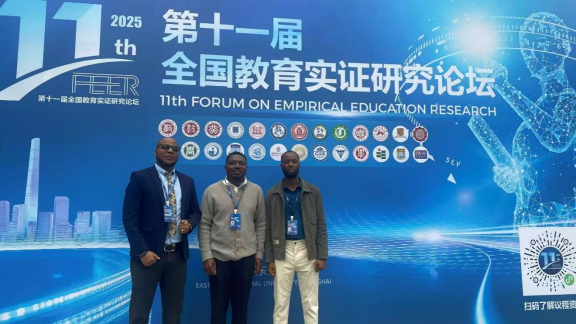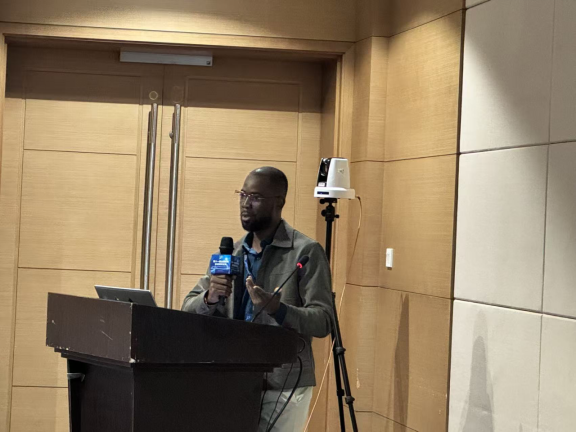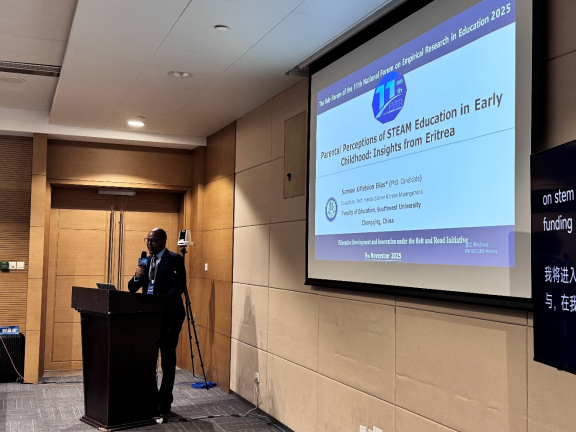西南大学教育学部留学生参加第11届全国教育实证研究论坛并作专题报告
发布时间:2025-11-14 11:03作者:来源: 浏览次数:
第11届全国教育实证研究论坛于2025年11月7日至9日在上海举行。西南大学教育学部三名留学生代表参会,并在“一带一路”国家教育实证研究分论坛上作专题学术报告。本届论坛汇聚国内外知名学者、教育工作者及研究人员,共同探讨基于证据的教育改革路径。教育学部留学生提交的三项研究立足全球教育实践,涵盖教师专业发展、AI技术整合及早期STEAM教育等关键议题,获得与会专家高度认可,展现了我部留学生在人工智能教育应用、高等教育数字化转型等前沿领域的研究成果与国际视野。

加纳籍博士生David Anim Mante的报告题目为《Examining the Moderating Role of Generative AI in Advancing Teachers’ Professional Competencies: Evidence from Ghana》。研究基于加纳基础教育实地调研数据,证实教师自主学习能力与其专业知识、价值观及实践能力呈显著正相关,而生成式AI的适度使用能够强化这一关系,特别是在知识建构与教学实践优化方面成效突出。研究同时警示,过度依赖AI可能削弱教师专业判断力,主张采用“技术赋能与人文反思并重”的混合式发展模式,为全球AI时代的教师专业发展提供了重要参照。

埃塞俄比亚籍博士生Jecha S. Jecha围绕“AI Integration Readiness in Higher Education”展开研究,通过结构方程模型分析绩效期望、努力期望、外部支持等要素对高校AI采纳意愿的影响机制。该研究立足“一带一路”教育合作背景,强调制度支持与跨文化协作在技术转型中的关键作用,为推进区域高等教育数字化提供了实证依据与政策建议。

厄立特里亚籍博士生Samson Kifletsion Elias的报告《Bridging Continents through STEAM》,系统呈现了非洲国家早期STEAM教育中的家庭参与图景。研究发现,尽管面临资源约束,当地家长善于利用黏土、回收材料及传统工艺等本土资源丰富儿童科学启蒙经验;而家校有效沟通能显著提升家长参与度。研究倡导构建STEAM参与的文化响应模式,为多元文化背景下的早期教育创新贡献了非西方视角。

三项研究紧扣时代命题,既关注技术变革的教育影响,又重视文化适切性实践探索。参会期间,代表团成员与国内外同行深入交流,为进一步拓展国际研究网络、提升学术影响力奠定良好基础。
此次参会充分展示了我部留学生的学术素养与研究能力,未来将持续支持师生参与高水平国际学术交流,推动构建开放、协作、创新的全球教育研究共同体。
SWU Faculty of Education Student Delegates Share Research at the 11th National Forum on Empirical Research in Education
From November 7 to 9, 2025, three international student representatives from the Faculty of Education at Southwest University participated in the 11th National Forum on Empirical Research in Education, hosted by the Faculty of Education at East China Normal University (ECNU), Shanghai. The annual forum convened leading scholars, educators, and researchers from China and abroad to share empirical research, innovative methodologies, and evidence-based practices addressing contemporary educational challenges.
The Southwest University delegation contributed three distinctive yet thematically connected oral presentations, each exploring critical frontiers in education. Collectively, the research spanned the transformative role of technology in teacher development, readiness for AI integration in higher education, and the influence of parental engagement on early childhood STEAM learning. Together, these studies showcased the Faculty of Education’s commitment to evidence-based innovation that bridges local realities with global educational discourse.
David Anim Mante presented his paper titled “Examining the Moderating Role of Generative AI in Advancing Teachers’ Professional Competencies: Evidence from Ghana.” The study examined how Generative Artificial Intelligence (GenAI) influences the relationship between teachers’ self-directed learning (SDL) and their professional competencies, including professional knowledge, values, attitudes, and practice. The research found that SDL exerts a strong positive influence on all three competency dimensions and that GenAI further enhances professional knowledge and professional practice. Importantly, GenAI significantly moderates the effect of SDL on teacher competencies, amplifying its benefits while also revealing that excessive reliance on AI without guidance could have negative effects. The study emphasized that teacher professional development in the AI era is at a pivotal juncture. The challenge is not whether to adopt AI, but how to do so responsibly. Effective integration requires a hybrid approach that balances technological innovation with human judgment, reflection, and autonomy. In the digital age, teacher growth will depend on policies and practices that foster ethical engagement, reflective practice, and sustained professional development, according to the study. Okoye’s presentation sparked dynamic discussions on how AI can serve as a supportive scaffold for teachers, contributing significant insights to global debates on AI in education.
Jecha S. Jecha delivered a presentation titled “AI Integration Readiness in Higher Education: Structural Equation Modeling Analysis Based on UTAUT.” Delivered under the sub-theme of the Belt and Road Initiative, the study investigated factors influencing readiness for AI adoption in higher education institutions, applying the Unified Theory of Acceptance and Use of Technology (UTAUT) and employing Structural Equation Modeling (SEM). Jecha’s research highlighted the roles of performance expectancy, effort expectancy, facilitating conditions, and institutional support in shaping AI readiness. His presentation emphasized the importance of integrating technological innovations within institutional frameworks that support faculty development and cross-cultural collaboration. Participation in the forum also facilitated meaningful networking with scholars working on similar themes, creating opportunities for future research collaboration. This study reinforced the Faculty of Education’s contribution to international discourse on AI integration, particularly in higher education settings within the Belt and Road region.
Samson Kifletsion Elias' presentation, titled “Bridging Continents through STEAM,” offered a non-Western perspective on parental engagement in early childhood Science, Technology, Engineering, Arts, and Mathematics (STEAM) education. The study examined the beliefs, practices, and challenges faced by Eritrean parents in supporting their young children’s STEAM learning, highlighting the impact of cultural paradigms and home-school interactions. The research identified that parental involvement is often framed through traditional academic expectations, with less emphasis on inquiry-driven, playful learning. However, the study showed that resource constraints do not prevent effective engagement; parents frequently use locally available materials—such as clay, recycled items, traditional crafts, and nature-based activities—to develop foundational STEAM skills. Teacher-parent communication emerged as a crucial factor, with clear guidance from educators significantly enhancing parental participation. The presentation concluded by advocating culturally responsive models of STEAM engagement that integrate global best practices while respecting local values, underscoring the importance of collaboration among policymakers, teacher education programs, and communities.
The three presentations collectively illustrated the Faculty of Education’s dedication to addressing pressing educational issues through rigorous empirical research. By exploring AI’s role in teacher development, readiness for higher education transformation, and culturally responsive approaches to early learning, the delegation highlighted the faculty’s capacity to contribute meaningfully to both local and international educational debates. Participation in the forum also enabled the delegates to engage with peers from diverse institutions, facilitating the exchange of ideas and laying the groundwork for potential research collaborations. The experience provided insights that will inform future pedagogical innovations, research projects, and institutional initiatives at Southwest University. The delegation expressed gratitude to the Faculty of Education at Southwest University for its support of their participation and to the Faculty of Education at ECNU for organizing a forum that fostered intellectual exchange and professional growth. The knowledge and connections gained from this event are expected to enrich teaching, research, and policy engagement within the faculty, reflecting Southwest University’s commitment to advancing education through evidence-based innovation and global collaboration.
撰稿:David Anim Mante、Jecha S. Jecha、Samson Kifletsion Elias、李诗清
初审:王 雪
复审:戴华鹏
终审:王正青
- 学部概况
- 部徽
- 部训
- 部长寄语
-
西南大学教育学为“双一流”建设学科。教育学部是办学历史悠久的研究型学部,1984年获教学论博士学位授权点,2003年获教育学一级学科博士学位授权,2007年课程与教学论获批国家重点学科,在教育部第四轮学科评估中被评为A类学科。【点击查看详细介绍】
地址:重庆市北碚区天生路2号田家炳教育书院 电话:023-68252305 网址:jyxb.swu.edu.cn
-
西南大学教育学部
The Faculty of Education , Southwest University
-


